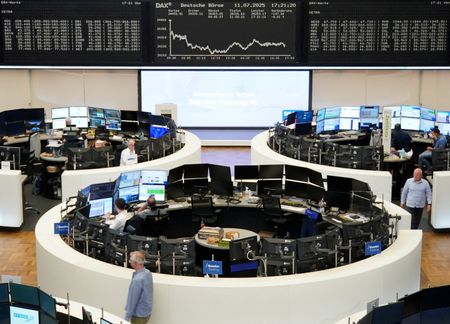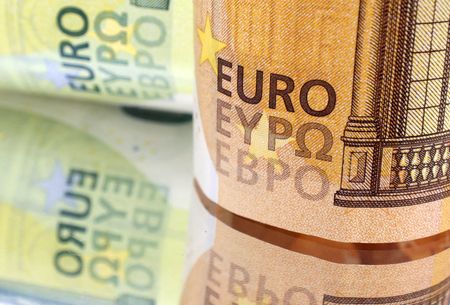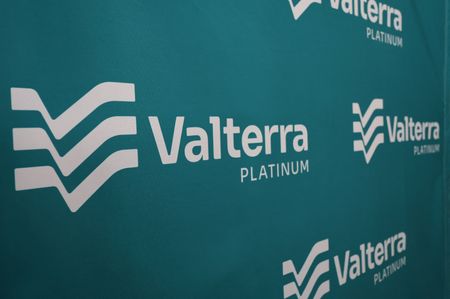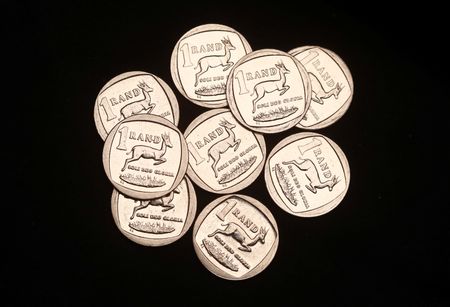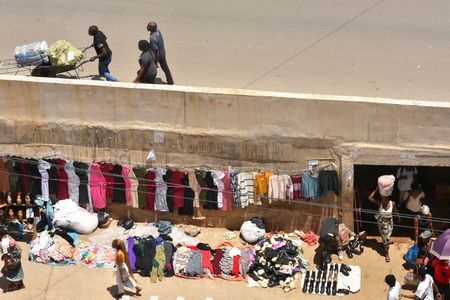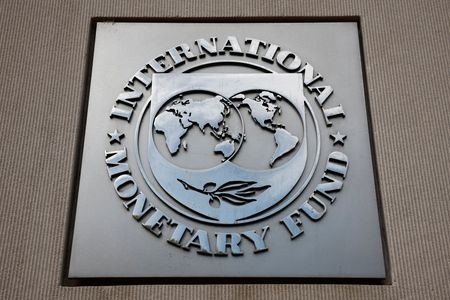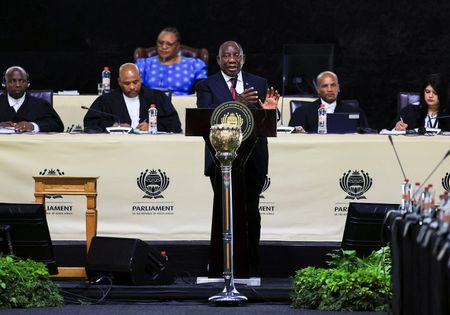By Marc Jones
LONDON (Reuters) – Europe’s major stock markets made modest gains while the euro fell in early trading on Monday as investors greeted a trade agreement between the United States and European Union with cautious relief.
The STOXX 600 opened 0.7% higher and the euro was down 0.3% against the dollar at the start of what looks set to be a pivotal week in U.S. President Donald Trump’s global trade war.
The framework deal, which European Commission President Ursula von der Leyen described as the best the bloc could get, will impose a 15% import tariff on most EU goods and see the EU spend $600 billion on U.S. investments while opening up some important parts of its market.
“The deal is better than the 30%-50% tariff rates threatened over the last couple of months, although it is probably as bad as the universal tariff rates being discussed late last year,” ING analyst Chris Turner said.
While the U.S.-EU deal averts a more damaging standoff between the two blocs, which account for almost a third of global trade, a number of European capitals complained it was lopsided in favour of Washington.
Other major economies are still scrambling to finalise deals ahead of Trump’s August 1 deadline. Talks between the U.S. and China taking place in Stockholm on Monday are expected to extend their trade truce for another 90 days, while Europe’s deal comes hot the heels of one struck with Japan last week.
MUFG FX strategist Derek Halpenny said the EU deal was ultimately, “good news from a financial markets perspective as it reduces uncertainty further still ahead of 1st August, which is now looking like an insignificant date.”
Prashant Newnaha at TD Securities meanwhile called it “a big win for the U.S.” given the forced purchases of U.S. energy and military equipment and “zero tariff retaliation by Europe”.
Germany’s exporter-heavy DAX, France’s CAC 40, Italy’s FTSE MIB and Spain’s IBEX were all up between 0.4% and 0.8% after the first hour of trading, while S&P 500 and Nasdaq futures pointed to fresh record highs on Wall Street when it resumes.
The euro had initially strengthened when Asian markets reopened, but it steadily dropped into the red as the dollar nudged higher across the board. [/FRX]
Euro area government bond yields, which are a proxy for borrowing costs, also edged down.
Germany’s 10-year yield, the euro area’s benchmark, was 0.5 basis points lower at 2.71%, after rising more than 10 basis points at the end of last week when the European Central Bank curbed talk of imminent rate cuts.
FED, BOJ AWAIT
Overnight in Asia, MSCI’s broadest index of regional shares ended 0.3% weaker with Japan’s Nikkei falling back more 1% after it hit a one-year high last week.
The Australian dollar, often seen as a proxy for global risk appetite, was at $0.657, hovering around the near eight-month peak it had scaled.
In an action-packed week, traders are also waiting for interest rate decisions from both the U.S. Federal Reserve and Bank of Japan, monthly U.S. non-farm payrolls and earnings from megacap companies Apple, Microsoft and Amazon.
While the Fed and the BOJ are expected to maintain rates, comments from the officials will be crucial for investors to gauge the interest rate path. The trade deal with Japan has opened the door for the BOJ to raise rates again this year.
Meanwhile, the Fed is likely to be cautious on any rate cuts as officials seek more data to determine the impact of tariffs on inflation before they ease rates further.
But tensions between the White House and the central bank over monetary policy have increased, with Trump repeatedly lashing out at Fed Chair Jerome Powell for not cutting rates. Two of the Fed Board’s Trump appointees have articulated reasons for supporting a rate cut this month.
In commodities, oil prices rose after the U.S.-EU trade agreement. Brent crude futures and U.S. West Texas Intermediate crude both rose 0.5%. [O/R]
Gold prices dribbled down 0.1% to $3,334 an ounce – their lowest in nearly two weeks on reduced appetite for traditional safe havens. [GOL/]
(Additional reporting by Akur Banerjee and Gregor Stuart Hunter in Singapore; Editing by Joe Bavier)

